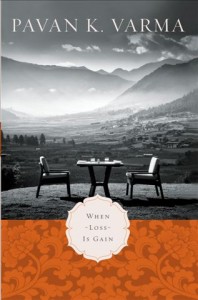
When Loss is Gain, Pavan K. Varma, Rain Tree, 2012, Rs 395, pp.206
How many of us get a second chance in life? More importantly, what would we want to do were we to get the near-magical chance to start over? Would we fall back into the old pattern of habit and custom? Or, would we do all those things that we ordinarily wouldn’t or couldn’t? Pavan K. Varma captures this fleeting idea and teases out a tale of frailty and courage, defeat and victory, loss and gain. In this, his debut attempt at fiction after a dozen published works including meditations on the Kamasutra and the middle class, the Urdu poet Ghalib and the havelis of Delhi as well as translations of Kaifi Azmi and Gulzar, he displays once again his uncanny ability to seize an idea, a moment, and make it come alive to the fullest. Carpe dieme, the ancients called it; in Varma’s lexicon, it is called When Loss is Gain.
Does that make Varma’s book a novel of ideas… the sort that, in Aldous Huxley’s famous words, deals with ‘the drama implicit in an idea which becomes explicit when it is shown as a point of view'? When Loss is Gain is definitely a deeply philosophical work insofar as it looks at ethical and moral questions related to everyday life in the light of principles culled from Hinduism and Buddhism. And, yes, it has plenty of drama of ideas, too. Yet, in another sense, it moves away from its philosophical underpinnings and becomes a bildungsroman, a sort of coming of age novel dealing with the moral and psychological growth of its protagonist.
To flesh out the drama of ideas, Varma employs a series of dichotomies: life and death, loss and gain, happiness and fulfillment, physical and spiritual, rational and irrational. A dialogue between dukkha and ananda -- sorrow and its conjoined twin happiness -- lies at the heart of this drama which moves from cosmopolitan Delhi to the majestic mountains of Bhutan. And, all along, the weft of poetry runs through the woof of plot and character to create a tapestry that is as jewel bright as it is richly textured. An eclectic mix of verses from sources as diverse as Bulle Shah, Basavanna, Nida Fazli, Hairat Allahabadi, Amir Khusro, Kabir, and of course, Varma’s old favourite, Ghalib leavens the narrative with the yeast of a robust, full-bodied flavour. Readings from Shankaraachaya’s Nirvana Shatakam as well as recitations from the Isa Upanishad fit in seamlessly.
A cataclysmic turning point, a moment of epiphany – usually reserved for the climax --happens early in the novel. Anand, a hard-drinking, a hard-working, ambitious lawyer, is diagnosed with pancreatic cancer. Within hours of the doctor’s pronouncement that he has only few months to live, his carefully constructed life unravels: his wife leaves him for his best friend, who also happens to be his boss. Faced with the prospect of death, Anand realizes how wrong all his priorities had been all his life: ‘I’d had the gift of life, and I had treated it so utterly, utterly shabbily.’ Only when he is condemned to die, does he realize ‘the sheer waste of it all and no time to make amends’. ‘So much had been heaped on my plate, and I had but nibbled at it,’ he rues.
However, the prognosis of cancer turns out to be wrong. This entirely unexpected reprieve causes Anand to review the wreckage that was his life and do all the things a high-powered life as a Delhi lawyer enmeshed in petty office politics had not allowed him to do. He decides to ‘just hang out, to live from day to day, to float without direction, to immerse (himself) in the natural eddies and pools of existence, to live for a whim rather than a goal.’ To live this life, he invests his life’s savings to maintain a modest lifestyle, travels to watch the sunrise on the Ganga in Varanasi and the sunset on a sand-dune in Jaisalmer before finally taking off for a retreat in the remote mountains of Bhutan. Here, Anand meets Chimi who teaches him he cannot just sit by the river bank of life; he must wade in. Chimi, with her vigorous love for life, makes him wonder: ‘By sheltering myself from the possibility of pain, was I also building barriers to the possibility of joy?’ When he falls in love with the lovely but haunted Tara, who is training to become a nun, he realizes that the gift of life must not to be renounced. The bridge between dukkha and ananda is as narrow as it is precarious, but it must be walked. In the end, the novel is as much a celebration of life as it is a call to free oneself from ‘the tyranny of trivia’.
(This review appeared in The Hindu, 4 March, 2012)
No comments:
Post a Comment